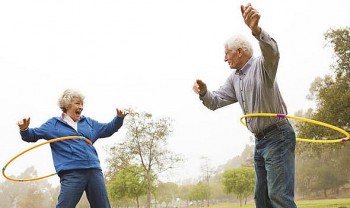10 Longevity Secrets of the Japanese People
 Ranking the Longevity of 12 Zodiac Signs - Who is Forever Young? Ranking the Longevity of 12 Zodiac Signs - Who is Forever Young? |
 Top 10 Best Magic Foods That Can Help You Live Longer Top 10 Best Magic Foods That Can Help You Live Longer |
 |
| The Japanese live long lives because of their healthy eating habits |
| Contents |
Japan - Highest Life Expectancy and Longer Healthier Life
The average life expectancy in Japan in 2019 was 87.45 years for women and 81.41 years for men, according to the Japanese newspaper Nippon Times.Japan's average life expectancy at birth is 83.7 years according to the most recent World Health Organization report from 2019 (86.8 years for women and 80.5 years for men). Contrast that with the 69.1-year average male life expectancy for all of humanity. The same age is 69.16 for Indians.
With an average life expectancy of 84, Japanese people have been ranked as the healthiest people in the world for three years running. As a result, they have a variety of healthy habits that prolong their lives.
With an average follow-up of 18.9 years, the Tohoku University School of Medicine in Japan surveyed 92,000 people and discovered that eating habits were linked to a lower risk of cardiovascular, all-cause, and cardiac death in Japanese people.
There are many factors that contribute to the Japanese people's longer and more healthy lives. Find out why people in this region have a longer and healthier life expectancy.
 Where Are "5 Blue Zones" With A Longest Life Expectancy in the World Where Are "5 Blue Zones" With A Longest Life Expectancy in the World |
1. Eat fish often
Japan is rich in seafood and people especially like to eat sea fish. These foods are rich in omega-3 polyunsaturated fatty acids, which are beneficial for heart health, reducing the risk of lung, prostate, pancreatic and dementia.
2. Likes to eat beans
Soy foods such as tofu, natto and miso are common in the Japanese diet. Studies have found that eating beans properly can help reduce the risk of breast cancer, stomach cancer, cardiovascular disease, diabetes, and other diseases.
3. Add enough fiber
Fruits and seaweed in the Japanese diet meet the human body's need for soluble fiber, while mushrooms, beans, vegetables... meet the need for insoluble fiber. Fiber may help reduce the risk of breast cancer, prostate cancer, stomach cancer, and other cancers. It can also reduce the risk of cardiovascular disease and all-cause mortality.
4. Salt control
Since 1975, the Japanese Ministry of Health has launched an initiative to reduce salt for the masses. They don't drink too much miso soup, don't drink soup when eating noodles... Strictly controlling salt intake can reduce the risk of cardiovascular disease.
5. Good eating habits
The Japanese believe that eating too much will prolong the digestion time and affect the normal functioning of organs in the body.
Therefore, they have a habit of eating 8 full portions, chewing each piece slowly, which can increase the feeling of fullness without adding to the burden on the stomach, helping the body absorb nutrients.
6. Wear socks while sleeping
In the Japanese concept, socks are the clothes of the feet and wearing socks is also their way of respecting guests who come to the house to play. Gradually, they form the habit of not wearing shoes in the house but only wearing socks. When they sleep, they also wear socks to keep their feet warm.
A small study in Korea found that wearing socks while sleeping not only helps you fall asleep more easily, but also prolongs sleep time by 30 minutes, waking up 50% less at night than usual. This action can also promote the dilation of blood vessels in the soles of the feet compared to walking barefoot, helping the body to dissipate heat faster and lower the core temperature, making you feel more comfortable and easy. get into sleep. On the other hand, wearing socks while sleeping will stimulate the activity of nerve cells, causing drowsiness.
If you choose to wear socks to sleep, choose socks made of pure cotton. The reason is because the sweat glands in the soles of the feet are overactive. If you choose tight socks, not only will your feet feel stuffy, but it will also breed bacteria and fungi, which can cause tinea pedis and other problems.
Do not wear socks that are too tight because it will affect the blood circulation of the feet, which can cause high blood pressure, causing uncomfortable feelings such as cold feet, swollen feet, even numbness.
You should choose thin socks in spring and summer, to help the skin of your feet not lose moisture. In the autumn and winter, the weather is dry, the temperature is low, you can choose cotton socks or wool socks to increase warmth.
7."Hara Hach Bun Me"
This proverb is well-known in Japan. It means to only eat until you are 80% (8 out of 10) satisfied. It typically takes at least 20 minutes for the body to send the brain a signal telling it to stop eating because it has consumed enough calories. By that time, one eats more than is necessary, adding to the strain on the digestive system. The 'hara hachi bun me' clock is used as a stop-eating signal by the Japanese.
8.The tradition of drinking tea
Japanese people enjoy drinking tea, and it is a significant part of their culture. All over the Japanese archipelago, matcha tea is very popular. The green tea brew is made using specially grown and processed tea leaves that are rich in nutrients and antioxidants.
Antioxidants found in abundance in this traditional beverage support the immune system, fight cancer, aid in digestion, increase energy levels, and control blood pressure. According to legend, matcha tea slows cell aging and preserves membrane cells.
9.Walk, walk, walk
Sedentary behaviors are detested by the Japanese. Both young and old enjoy taking walks. An average Japanese person finds it easy to sit on the floor. Toilets are also made for squatting, not sitting, which keeps the core engaged and is better for your muscles and intestines. Even commutes are not sedentary.
Students and workers commute to the train station on foot or by bicycle, stand in line, and then walk to their respective jobs. Seiza is the term for the traditional kneeling social position that involves resting on one's shins and tucking one's feet under one's bottom. It turns out that this is exactly what the doctor ordered to maintain the body's strength and flexibility.
10.Ikigai
The Japanese adhere to the ancient philosophy known as "ikigai," which contends that living is not enough and that one must seek happiness and meaning in life. Find your ikigai, or "reason to live," according to their philosophy. It is crucial for life fulfillment and that you can discover joy and meaning in many facets of your life, such as giving back to the community, eating healthfully, and being surrounded by supportive loved ones.
In Conclusion
You have just discovered 10 secrets to help the Japanese live long. However, there are still many other reasons for you to consider.
In addition to excellent healthcare and a healthy diet, studies show that the Japanese may have a genetic advantage due to two genes in particular, DNA 5178 and ND2-237Met genotype, which are common in the Japanese population. However, not everyone in Japan will be blessed with this genetype; it is a matter of chance. Some age-related diseases, such as type 2 diabetes, strokes, heart attacks, cerebrovascular and cardiovascular diseases, are prevented by this set of genes.
In Japan, it is also customary to care for elderly family members rather than placing them in nursing homes, as is common in many western nations. Living with your family in old age has psychological advantages that make people happier and live longer. The elderly assist in imparting knowledge to the younger generation that only grandparents can. It appears that the symbiotic relationship aids in aging gracefully and securing childcare.
 Explore Lerik Village Where Oldest People In The World Live Explore Lerik Village Where Oldest People In The World Live Lerik, a mountainous region in Southern Azerbaijan, is famous for being the home of many people over 100 years old. Read on to know more ... |
 Top 10 Oldest Person Alive in the World 2023 (Updated) Top 10 Oldest Person Alive in the World 2023 (Updated) Who is the oldest person alive in the world today? Some people have just passed away, so the position of the oldest living person in ... |























